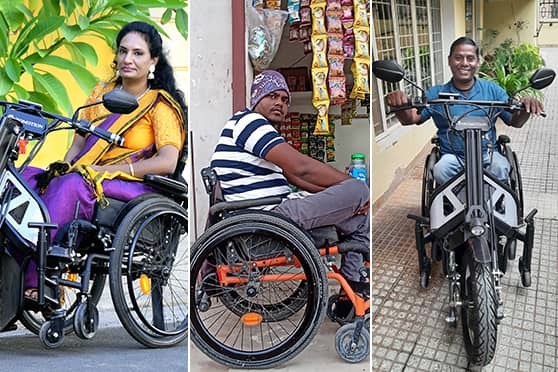IIT Madras-incubated start-up designs customised wheelchairs with CSR funding of Rs 75 lakh


The Indian Institute of Technology (IIT) Madras has developed India’s first indigenous motorised wheelchair vehicle.
NeoBolt, a battery powered clip-on device for wheelchairs, and NeoFly, a personalised wheelchair designed to enhance health and lifestyle of persons with disability, have been commercially launched by NeoMotion,a sfart-up incubated at IIT Madras.
A total of 29 NeoBolt motorised outdoor mobility attachments and 160 NeoFly wheelchairs have been donated to 163 beneficiaries through three independent CSR projects, amounting to a total CSR funding of Rs 75 lakh
Before distributing the wheelchairs, the beneficiaries were assessed and selected on the basis of socio-economic status, need assessment, diagnosis and age, among other criteria.
User measurements and medical assessment are conducted remotely via video call and every wheelchair customised. This helps minimise chances of common side effects such as back pain and shoulder pain.
“The beneficiaries find NeoFly and NeoBolt to be complete indoor and outdoor solutions. They are finding themselves to be more productive, with respect to daily activities such as going to the market, travelling for their job and working long hours sitting on the wheelchair, which they could not achieve with the traditional wheelchairs,” said Swostik Sourav Dash, chief executive officer of NeoMotion and an IIT Madras alumnus.
Dash said a mobility device should empower a user to get educated and employed. “We are working on a project — Livelihood on Wheels — where NeoBolt can be a tool to get jobs such as delivery of newspaper, milk or food items and other last-mile delivery jobs, and earn a livelihood. The project model incorporates a percentage of the salary earned to be deposited in a corpus to fund the next set of NeoBolts for the next set of beneficiaries,” he said.
Laxmi Priya from Puducherry has not only started travelling to work alone on her NeoBolt but is also able to go to the market or visit the temple without help. A spinal cord injury had restricted her movement but she continued to work as cashier at a hotel.
The Neobolt along with the NeoFly wheelchair has been a lifechanger for M Muniswamy of Bangalore, who is affected by polio. His daily commute of about 5km from home to work has become easier.
Vikas from Jharkhand suffered from spinal cord injury but continued to teach primary schoolchildren at a tuition centre.
“We are partnering with CSR bodies, NGOs in the vocation training space and potential employers who can employ people with locomotive disability and promote diversity and inclusion in the process,” Dash said.